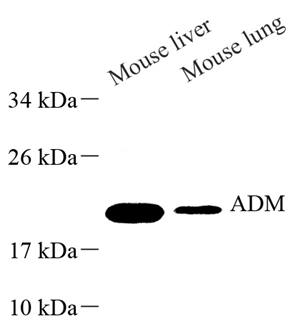Anti-Adrenomedullin / ADM Rabbit pAb (100 μl)
| Reactivity: | M |
| Applications: | WB |
| Host Species: | Rabbit |
| Clonality: | Polyclonal |
| Full Name: | Adrenomedullin rabbit polyclonal antibody |
Gene Name: | ADM |
Synonyms: | ADM, Adm, AM, PAMP, adrenomedullin |
Immunogen: | KLH conjugated Synthetic peptide corresponding to Mouse ADM |
Isotype: | IgG |
Purity: | Affinity purification |
Predicted MW. | 21 kDa |
Observed MW. | 21 kDa |
Uniprot ID: | P97297 |
Product Usage Information
Applications | Species | Dilution | Positive tissue |
WB | Mouse | 1: 500-1: 1000 | liver, lung |
Background
Adrenomedullin (ADM or AM) is a vasodilator peptide hormone of uncertain significance in human health and disease. ADM is a peptide expressed by all tissues, and found in the circulation. Adrenomedullin may function as a hormone in the circulation control because it is found in blood in a considerable concentration. It was initially identified as a vasodilator, and some argued that it is the most potent endogenous vasodilatory peptide found in the body. Other effects of AM include stimulating the growth of new blood vessels (angiogenesis) and increasing the tolerance of cells to oxidative stress and hypoxic injury. Adrenomedullin is seen as a positive influence in diseases such as hypertension, myocardial infarction, chronic obstructive pulmonary disease and other cardiovascular diseases, whereas it can be seen as a negative factor in potentiating the ability of cancerous cells to extend their blood supply and thereby enable further cell proliferation.
Images
 |
Western blot analysis of ADM (GB11683) at dilution of 1: 500 |
Storage
| Storage | Store at -20°C for one year. Avoid repeated freeze/ thaw cycles. |
| Storage Buffer | PBS with 0.02% sodium azide, 100 μg/ml BSA and 50% glycerol. |
